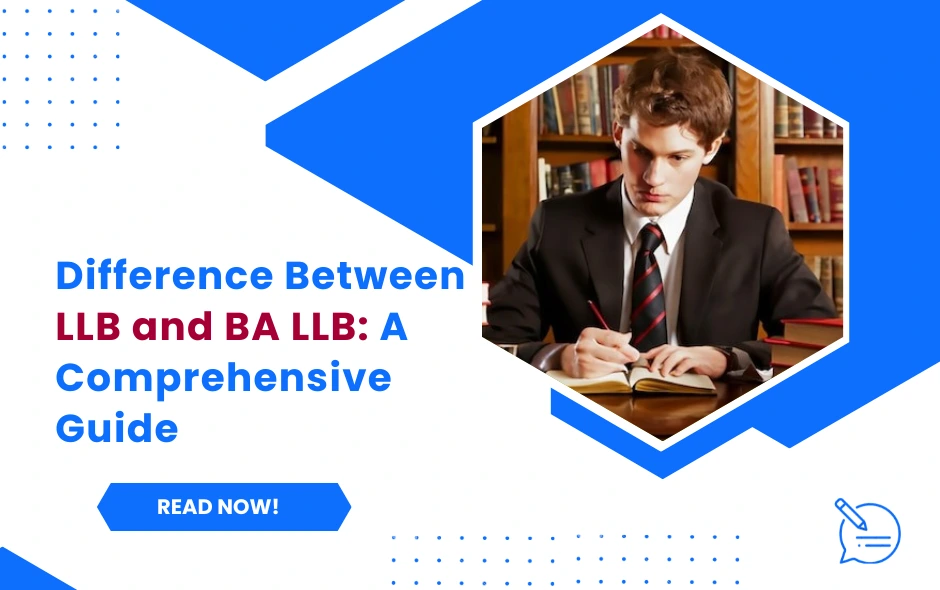LLB Admission Eligibility Criteria: A Comprehensive Guide
LLB Eligibility Criteria: LLB Admission, Last Date, Admission Process
A Bachelor of Law, commonly known as an LLB, is a professional undergraduate program. It is the first step for candidates who aspire to become legal practitioners. The candidates must be admitted to the full-time program as a diploma or part-time degree is not approved by the Bar Council of India. LLB is a three-year law program that introduces students to the concepts of corporate law, legislative law, and other different forms of law. The LLB eligibility criteria are 10+2—scope after LLB is Legal Advisor, Lawyer, Public Prosecutor, etc.
For admission in LLB, students must have a bachelor’s degree with a 45% mark from a recognized university. The candidate must also clear-cut entrance exams such as CLAT, LSAT, SLAT, etc., as per the college requirement. LLB admission fees vary from INR 10,000 to INR 3.5 LPA.
What is an LLB course?
LLB stands for Bachelor of Law, or Legum Baccalaureus. The undergraduate program provides students with a thorough understanding of the legal system. It includes all guiding principles, ideas, practical applications, and procedures. The LLB course duration is three years. LLB eligibility criteria are that students must have a minimum of 45% after graduation.
Why choose an LLB course?
- Specialization in various types of Law
- High demand for LLB graduates
- Excellent salary packages
- Wide range of roles
- Higher education opportunities
Who Should Pursue an LLB Course?
It is irrefutable that an LLB degree is undeniably tailored for candidates looking forward to practicing law. The skills honed during an LLB are critical thinking, research, communication, and negotiation. The LLB eligibility criteria is a bachelor's degree with 45% marks. Whether passionate about justice, business, politics, or international relations, an LLB can be a stepping stone to a fulfilling career.
LLB subjects
The courses taken for the LLB degree set students up for success in various legal fields. Due to the breadth of the subject matter, universities have designed a curriculum that includes lectures and simulated trials, research papers, and practicums in the courtroom.
Year 1
The first semester of this course provides an overview of criminal law and the laws about women, families, and workers, laying the groundwork for the more advanced material covered in subsequent semesters.
In the second semester, you'll study the professional and constitutional sides of the law.
Semester 1:
- Labor law
- Family law I
- Crime
- Women and law1
Semester 2:
- Family laws II
- Law of Tort and Consumer Protection Act
- Constitutional law
- Professional ethics
Year 2
The environmental and human rights dimensions of international law are the primary emphasis of the third semester. LLB coursework covers a broader range of legal topics, including evidence law, arbitration, and conciliation.
In the final semester, you'll put everything you've learned thus far into practice concerning LLB courses like Law and Justice. The course covers intellectual property law and associated topics. The International Economic Laws are also included to help you navigate corporations' more complex legal landscape.
Semester 3
- The law of evidence
- Human rights and international law
- Environmental law
- Arbitration, conciliation, and alternative
Semester 4
- Jurisprudence
- Practical training: legal aid
- Property law
- International Economic law
Year 3
In the fifth semester, you'll go even deeper into the LLB curriculum as you learn how to understand legislation precisely. The emphasis this semester is on the finer issues, such as legal writing and real estate law.
In its sixth semester, this course takes a deep dive into criminal law and procedure. In addition to theoretical knowledge, the last semester of this course provides valuable hands-on experience.
Semester 5
- Civil procedure code (CPC)
- Interpretation of Statutes
- Legal writing
- Land laws
- Administrative law
Semester 6
- Code of criminal procedure
- Company law
- Practical Training: Moot court
- Practical training II: Drafting
- Criminology
Optional subjects
An LLB degree curriculum often consists of required and elective courses.
Beginning in the last semester of their third year, students may practice law as juniors under a senior attorney to gain exposure and experience.
Internships play a significant role in the curriculum for aspiring lawyers.
- Contract
- Trust
- Women and Law
- Criminology
- International Economics Law
Admission in LLB Open at CGC Jhanjeri
Unlock the doors to a dynamic and rewarding legal career! Admission to LLB is now open at CGC Jhanjeri. At CGC Jhanjeri, we don't just teach law; we groom leaders. Our world-class faculty, cutting-edge infrastructure, and legacy of excellence make us the first choice for budding legal minds. Dive deep into moot courts, internships, and experiential learning that prepares you for exams and real-world challenges.
.jpg)



















